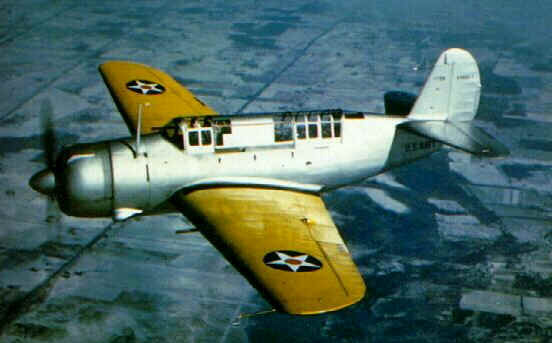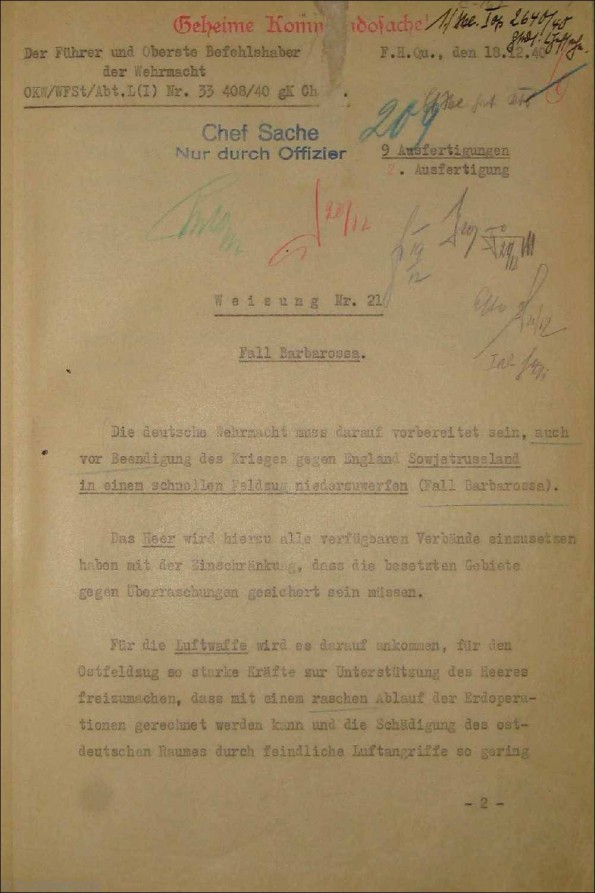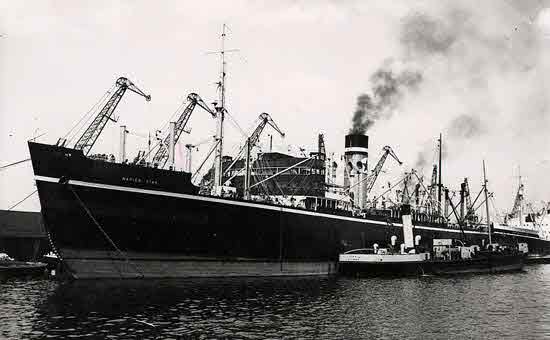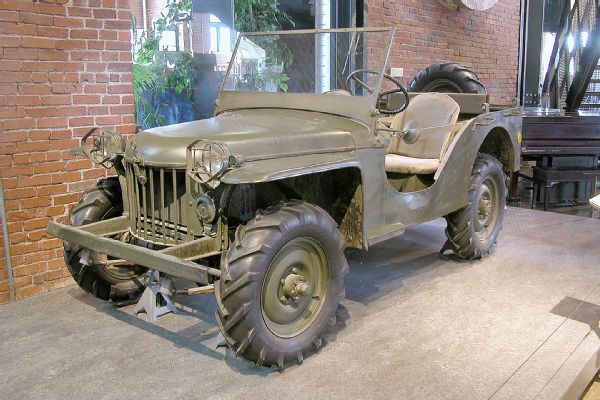Wednesday 18 December 1940
 |
| The Curtiss XSB2C Helldiver prototype in flight, December 1940. |
Preparations are to be "concluded by 15th May 1941." The intent is to destroy the "bulk of the Russian Army stationed in Western Russia... by daring operations led by deeply penetrating armored spearheads." A barrier will be erected "against Asiatic Russia on the general line Volga-Archangel." This line evidently would run roughly from Astrakhan north along the Volga via Stalingrad.
Hitler orders that the main theater of operations is to be north of the Pripet Marshes, with two army groups in that portion of the front. One, the Northern Army Group, is to head in the "general direction" of Leningrad. "Only after the fulfillment of this first essential task," namely the destruction of Soviet forces operating in the Baltic area, "will the attack be continued with the intention of occupying Moscow, an important center of communications and of the armaments industry." The southernmost army group, that below the Pripet Marshes, is given short very shrift in the order - it is to operate from Lublin toward Kyiv and "destroy all forces west of the Dnieper (river) in Ukraine." Only general tasks are to be handled by the Luftwaffe and Kriegsmarine. This is to be primarily an army operation, with other services providing support and/or occupied elsewhere.
 |
| One of the dozen copies of Hitler's Directive No. 21, showing numerous security clearances and acknowledgments. |
Australian troops are being brought forward, including the 16th and 19th Australian brigades, to lead assaults on Bardia and the strategically important port and fortress of Tobruk. These troop movements will take roughly two weeks to complete. The British troops are aided by the fact that the Italian strong points, such as Fort Capuzzo, are in excellent shape due to the minimal amount of fighting there.
In Malta, it is the coldest winter in 17 years. Snow even falls on the higher elevations, an unusual occurrence. Two workers at the Malta Dockyard, B J Lewis, Chargeman of Fitters, and Frank Mallia, Chargeman of Labourers, are awarded the George cross for protecting an anti-aircraft gun hit by bomb splinters during an air raid on 24 September. There also is an air raid today by one bomber which causes some damage in the dockyard. The RAF shoots down the bomber.
Convoy MW 5B, the fast part of the MW 5 convoy, departs from Alexandria for Malta. Many of the British air and naval operations over the coming week will be intended as distractions from this convoy.
Italian/Greek Campaign: The Greek 3rd Infantry Division continues struggling forward from Porto Palermo toward Himara on the Adriatic coast. The weather is terrible, but the Greeks are making progress toward capturing the tactically important Giami high ground. The Greeks are readying a coordinated assault on the port on the morrow. The RAF bombs the port of Valona, while the Italians use their fleet to bombard the Greeks along the coast. The Royal Navy also is active along the Albanian coast, with battleships HMS Valiant and Warspite joining in with the RAF's attack on Valona.
European Air Operations: The RAF returns to Mannheim during the night with 17 aircraft in a classic follow-up raid to the recent terror raid. The RAF also attacks the submarine pens at Lorient. The Luftwaffe is very quiet today.
Battle of the Atlantic: The British Admiralty knows there are strong German forces operating in the Atlantic, and, despite allocating significant forces to track them down, so far has been unable to find them either in the South Atlantic or near the Azores/Canary Islands. Today, it tries again, sending aircraft carrier HMS Formidable and heavy cruiser HMS Norfolk as Force K to search the South Atlantic once again. They join aircraft carrier HMS Hermes and light cruiser HMS Dragon and armed merchant cruiser HMS Pretoria Castle on the search in the South Atlantic, and also cruisers HMS Cumberland, Newcastle, Enterprise, Dorsetshire and Neptune searching a little further north. Admiral Scheer is actually about 800 miles south of the Cape Verde Islands, and it's a big ocean.
Separately, battleship HMS Nelson and battlecruiser HMS Repulse depart from Scapa Flow for tactical exercises west of the Orkneys. Admiral Scheer's crew, meanwhile, is feasting off the massive bounty of fresh eggs and meat taken with the 8651-ton British refrigerated ship Duquesna, just captured off the Brazilian coast.
U-96 (Kplt. Heinrich Lehmann-Willenbrock) torpedoes and damages 10,746-ton Dutch tanker Pendrecht in Convoy OB 259 along the Western Approaches. The Pendrecht, like other tankers, is difficult to sink. The crew abandons ship, but then re-boards it and makes it to Rothesay under escort. U-96 later spots battleship HMS Repulse but is unable to attack.
U-100 (Kptlt. Joachim Schepke) torpedoes and sinks 10,116-ton British passenger ship Napier Star. There are 71 deaths (including 12 passengers), with the 15 survivors (including three women) rescued by Swedish freighter Vaalaren (some sources say there were 84 deaths). This is the last victory for Schepke and U-100, a very successful submarine, and its penultimate patrol.
Royal Navy submarine HMS Tuna, operating off the Gironde in the Bay of Biscay, sinks 172-ton French tug Chassiron. Earlier, it attacked but missed Italian submarine Brin, which was returning to its base at Bordeaux.
The Luftwaffe (Focke Wulf Fw 200 of I,/ KG 40) attacks and sinks 1010-ton British tanker RFA Osage off County Wicklow, Ireland. The Luftwaffe also damaged 2697 ton British freighter Tweed. Everybody survives these attacks.
Royal Navy 258-ton minesweeping trawler HMT Refundo hits a mine and sinks (after being taken under tow) off Harwich. There are two deaths.
German 6322-ton freighter Birkenfels hits a mine and sinks off the Scheide.
German vorpostenboot (flak ship) V-403 hits a mine and sinks in the Westerscheide (Western Scheldt).
British coaster Ability hits a mine and sinks in the Thames Estuary near Clacton-on-Sea, Essex.
Italian submarine Veniero torpedoes and sinks 2883 ton Greek freighter Anastassia. The Anastassia had been in Convoy SC 15, which dispersed. There are 18 deaths, and ten crew are made prisoners of war. The Anastassia actually drifts for some time is and sighted by another ship two days later, but it is a total loss and only a hazard to navigation after this.
Convoy WS51 ("Winston Special") departs from the Clyde and Liverpool. Faster units of the convoy will wait and depart later. The Winston Special convoys are destined for the Middle East and carry troops, tanks, and other supplies and equipment.
Royal Navy submarine HMS Triton is declared lost after failing to return to Malta on the 17th. There are 54 deaths and no survivors.
Convoy HX 97 departs from Halifax, Convoy BN 11 departs from Aden.
Canadian corvette HMCS Chambly (K 116, Lt. Commander Frank C. Smith) is commissioned.
 |
| The SS Napier Star, Joachim Schepke's final victory. |
German/Vichy French Relations: Fernand de Brinon becomes the Vichy French ambassador to the Germans occupying Paris. De Brinon is seen as quite sympathetic to the Germans and has had five private talks with Hitler during the 1930s. He also is friendly with German Foreign Minister Joachim Ribbentrop.
German Military: German 2nd SS Division "Das Reich" is in the process of transferring from the Netherlands to northern France. ith it goes Otto Skorzeny, who has gained some prestige within the Wehrmacht for designing a clever ramp for loading tanks on barges.
Soviet Military: General Andrey Eremenko (Yeryomenko) becomes Commander in Chief of the North Caucasus Military District. Eremenko is a tank expert, as shown during the conquest of eastern Poland in 1939, and has acquired the nickname "the Russian Guderian" - which is both a compliment to him and to General Heinz Guderian.
British Military: In a decision made long before, Air Vice Marshal Keith Park of No. 11 Group, the most prestigious Air Group and the one that defends London, is replaced by his long-time nemesis Leigh-Mallory of No. 12 Group. He and Air Marshal Dowding have been essentially cashiered due to political infighting within the RAF, though both have done sterling work. Once Dowding was removed from his position atop Fighter Command and replaced by Sholto Douglas, Park's removal was a given, as Park and Dowding continually supported each other during the Battle of Britain. Coincidentally, Dowding departs for the United States today aboard liner Leopoldville as part of his duties for his sinecure position within the aircraft production area. For his part, Park is going to some training duties.
US Military: The Curtiss SB2C Helldiver makes its maiden flight. The plane is reputed to have issues with its small vertical tail, but the flight is without incident.
Heavy cruiser USS Louisville makes port at Bahia, Brazil as part of its "Show the Flag" mission in Latin America.
German Homefront: Strangely enough, Hitler also gives a speech to students today, at the annual rally of young officer cadets at the Berlin Sportpalast. In it, he compares the populations of nearby nations to that of Germany and finds injustice in the amount of land that Germany occupies relative to its population - quite an interesting rationale for war:
There are approximately 85 million Germans in Germany. I do not even include in this figure our Low German Volksgenossen. England, the British Empire, has barely 46 million Englishmen at home. The French Empire has barely 37 million Frenchmen at home. Even the American Union, minus Negroes and Jews and Latinos and Germans, has barely 60 million true Anglo- Saxons. Russia has barely 60 million Great Russians.
And even today the unified racial core in Germany remains the largest by far; not only in value, in itself highly significant, but also in numbers, it is the greatest. By contrast, if we compare the percentage of Lebensraum occupied by the German Volk to that of the earth as such, then we must remark that our Volk is one of the most disadvantaged peoples of the world. Barely 600,000 square kilometers, in fact about 140 persons per square kilometer. 46 million Englishmen rule, control, and organize about 40 million square kilometers. Barely 60 million Great Russians rule an area of about 19 million square kilometers. About 60 million Anglo-Saxons within the American Union determine life within an area which encompasses about nine and a half million square kilometers. 37 million Frenchmen rule over life in an area of nearly ten million square kilometers.
In other words: the German Volk, in terms of the space it occupies, is by far the most modest there is on this earth.Hitler also justifies his actions - which, of course, are top secret, but the day's Directive obviously is what he is commenting upon here - from a candidly Darwinian perspective:
Truly, this earth is a trophy cup for the industrious man. And this rightly so, in the service of natural selection. He who does not possess the force to secure his 'Lebensraum' in this world, and, if necessary, to enlarge it, does not deserve to possess the necessities of life. He must step aside and allow stronger peoples to pass him by.This jibes nicely with Fuhrer Directive No. 21 issued to the Wehrmacht today. It is quite possible that he intended this address to serve as a companion piece to the Directive for historians.
 |
| Cine illustrato, 18 December 1940. |
December 1, 1940: Wiking Division Forms
December 2, 1940: Convoy HX 90 Destruction
December 3, 1940: Greeks Advancing
December 4, 1940: Italian Command Shakeup
December 5, 1940: Thor Strikes Hard
December 6, 1940: Hitler's Cousin Gassed
December 7, 1940: Storms At Sea
December 8, 1940: Freighter Idarwald Seized
December 9, 1940: Operation Compass Begins
December 10, 1940: Operation Attila Planned
December 11, 1940: Rhein Wrecked
December 12, 1940: Operation Fritz
December 13, 1940: Operation Marita Planned
December 14, 1940: Plutonium Discovered
December 15, 1940: Napoleon II Returns
December 16, 1940: Operation Abigail Rachel
December 17, 1940: Garden Hoses and War
December 18, 1940: Barbarossa Directive
December 19, 1940: Risto Ryti Takes Over
December 20, 1940: Liverpool Blitz, Captain America
December 21, 1940: Moral Aggression
December 22, 1940: Manchester Blitz
December 23, 1940: Hitler at Cap Gris Nez
December 24, 1940: Hitler at Abbeville
December 25, 1940: Hipper's Great Escape
December 26, 1940: Scheer's Happy Rendezvous
December 27, 1940: Komet Shells Nauru
December 28, 1940: Sorge Spills
December 29, 1940: Arsenal of Democracy
December 30, 1940: London Devastated
December 31 1940: Roosevelt's Decent Proposal
2020








